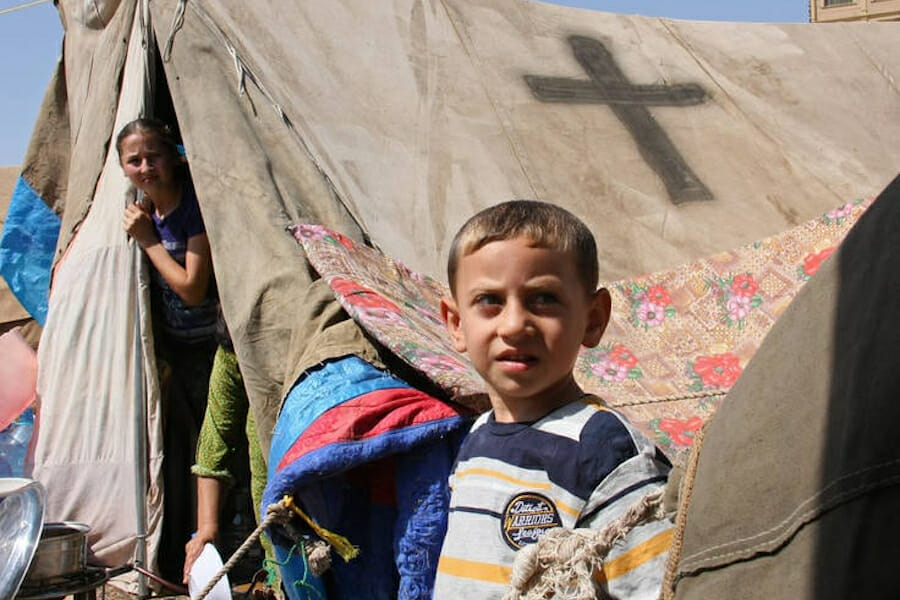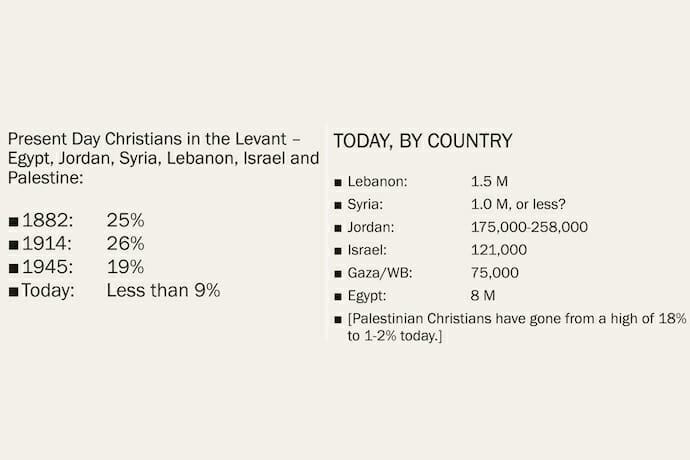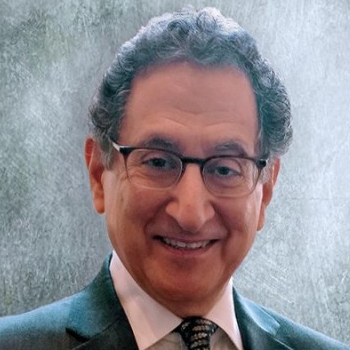
Culture
I Care about the Fate of Christians in Lebanon and the Levant
Recently, my colleague Ambassador Ed Gabriel (ret), President and CEO of the American Task Force on Lebanon (ATFL), decided to speak about Christians in the Middle East at an annual Middle East lecture. Some see the region and think – Syrian refugees, uncertain US policy, instability and fragile states, tensions with Iran and between Iran and many of the Gulf Arab states, the fatally wounded “deal of the century,” among others; whereas Ed and I also see an existential crisis coming for Christians in the region.
It’s our home. We are descendants of the first church founded by Jesus Christ in the Holy Land, and the continued decline of Christians, who have historically played a key role in the multicultural richness of the region, should be a wakeup call for action to protect and enable all minorities to co-exist in dignity. Without rigorous intervention, the Levant will lose its identity as a mosaic of cultures, religions, traditions, and ethnic groups. Today, the US Congress is poised to pass a resolution condemning the Armenian genocide in Ottoman Turkey (1914-1923) that started more than 100 years ago. Have we already forgotten what ISIS has done in Iraq and Syria, and the constant stress from al-Qaeda and extremists across the MENA region? Despite what American Christians may think, Lebanon, Jordan, Palestine, and Syria are home to the world’s oldest churches and communities. ISIS tried its best to stamp out two Christian villages in Syria in which Aramaic/Syriac the language of Jesus is still spoken, and, ironically, it was Hezbollah who came to their defense.
The table shows the decline of Christian populations during the last century. The loss has been accelerated by the rise of ISIS and al-Qaeda in Iraq and Syria and by economic and social challenges in Lebanon, Palestine, and Jordan. Once, Christians were vital to the region’s commerce, industry, and economic development, and made valuable contributions in education, health, public administration, and social services. Today, through institutions such as the American Universities in Cairo and Beirut, and NGOs including ANERA and AMIDEAST, CNEWA and CRS, and important networks of K-12 schools, vital work across all segments of society continues despite social and economic instability and growing pressure from extremists.
 The Lebanese, who have been emigrating in large numbers since civil disorders raked the country in the last quarter of the 19th century, are perhaps the best known Arab Christians abroad. Many, myself and Amb Gabriel included, are Maronite Catholics, a rite affiliated with Roman Catholicism. Our parents and grandparents came as political and economic refugees and you can find our communities in all 50 states. The same situation exists elsewhere. Lebanese families live and work throughout West Africa, from Nigeria to Senegal, and in Latin America, where the Lebanese and their Syrian and Palestinian cousins have played an outsized role in the economic, social, and political societies in which they live. Throughout the world, except the Far East, Lebanese can be found in business and the professions, bridging cultural spaces with their food, hospitality, educational contributions, and much more.
The Lebanese, who have been emigrating in large numbers since civil disorders raked the country in the last quarter of the 19th century, are perhaps the best known Arab Christians abroad. Many, myself and Amb Gabriel included, are Maronite Catholics, a rite affiliated with Roman Catholicism. Our parents and grandparents came as political and economic refugees and you can find our communities in all 50 states. The same situation exists elsewhere. Lebanese families live and work throughout West Africa, from Nigeria to Senegal, and in Latin America, where the Lebanese and their Syrian and Palestinian cousins have played an outsized role in the economic, social, and political societies in which they live. Throughout the world, except the Far East, Lebanese can be found in business and the professions, bridging cultural spaces with their food, hospitality, educational contributions, and much more.
Most Americans don’t know that the majority of Arab-Americans are Christians, from diverse churches including Catholic, Orthodox, and Protestant rites. Even those whose families have been here for more than 100 years still connect to the “old country” and are disillusioned by how perceptions of our heritage remain tainted by negative stereotypes and images that can be found throughout the American media.
I have been active in Arab and Lebanese American affairs for more than 40 years. I am often asked why I bother and how I got started. It’s quite simple, really. I was in Lebanon for the first time in 1972 visiting my family when the Israelis bombed the town of Marjayoun in the south of the country. My brother Roger and I mobilized dozens of Lebanese emigres who were attending a conference in Beirut to see first-hand the guerillas the Israelis claimed they were bombing.
Despite opposition from the Lebanese government, we boarded buses and went to see for ourselves. We saw a school, post office, farmland, and streets pockmarked with shells…I guess the guerillas were off that day. I stumbled across some unexploded ordinance, clearly marked as made in the US. It was then I committed to work to save my Lebanese heritage by educating my country, the US, about the price we were paying by our lack of understanding about what was at stake in Lebanon and the region.
At the top of that list is protecting the safety and dignity of the Christians who have contributed so much to the region and to the world. I fervently hope that we won’t be commemorating the disappearance of Christians from the region in the decades to come.

